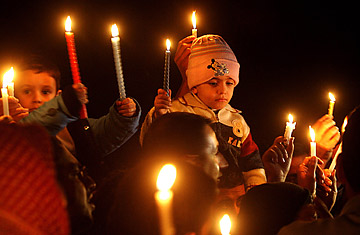
Palestinians hold candles during a protest against power cuts following the closure of the isolated territory's sole power plant today January 20, 2008 in Gaza, Gaza Strip.
When Gaza makes the front page, the photo is usually of Palestinian militants on the rubble of a bombed-out apartment building or at the funeral of a comrade, waving Kalashnikov rifles and howling defiantly against Israel. Those images have lately been replaced by ones of shivering, waiflike children holding a candlelight protest against Israel's blackout of large parts of Gaza. The kids are a reminder that not all of Gaza's 1.5 million Palestinians are gunmen, and that Israel's prolonged economic blockade of the territory is taking a heavy toll on civilians. The Israelis, of course, say they're acting to protect their own civilians, who have been terrorized by the hundreds of rockets fired from Gaza into the homes and fields of nearby Israeli farming communities.
Still, the international outcry over Israel's ban of fuel shipments to Gaza — spurred on by TV footage of Palestinian children huddled in the darkness and hospitals struggling to treat medical emergencies — prompted Defense Minister Ehud Barak on Monday to lift the fuel ban, and allow in medicine, supplies of cooking gas and a week's supply of fuel to run the power plant that feeds electricity to hospitals and sewage and water pumping stations.
Israeli officials grumble that they have been outfoxed by the PR machine of Hamas, and that they are being held to a double standard: While Israel is scolded by the United Nations for inflicting "collective punishment" on Gaza, Israelis say that Palestinian militants have no qualms about ignoring international condemnation and targeting Israeli civilians with their badly aimed homemade rockets. (Gaza militants fired over a hundred rockets during the past week, but miraculously no Israelis were killed.)
The latest cycle of conflict over Gaza casts a dark shadow over President Bush's efforts to broker a Middle East peace. Palestinian anger over the plight of Gaza forced President Mahmoud Abbas to threaten to withdraw from U.S.-sponsored peace talks with Israel. Abbas later said he'd stick it out, although Palestinian officials in Ramallah tell TIME that the Palestinian President is becoming increasingly isolated among his people, and even inside his own Fatah movement. Says Salah Bardoweel, a Hamas legislator, "This new round of attacks by Israel creates a belief that there is a security coordination between Ramallah, Tel Aviv and Washington against Gaza."
President Bush's attempts to corral other Arabs into his peace initiative also took a hit because of Gaza. On Monday, pro-Hamas protests spread throughout the Middle East, and even Egyptian President Hosni Mubarak — no friend of the Palestinian Islamists — reportedly called Israeli officials and asked them to lift the Gaza blockade. On Tuesday Egyptian police clashed with Palestinian protesters, who tried to force open Egypt's locked gate with Gaza at the Rafah crossing. At least 50 protesters, many of them women, were injured.
The Gaza crisis is also a setback for Israeli Prime Minister Ehud Olmert. In two weeks, he faces the release of a possibly scathing report card by the Winograd committee, appointed by the Israeli government to investigate the many failures that occurred in Israel's 2006 military campaign in Lebanon. Hoping to distract Israelis from the report's anticipated criticism of his performance, Olmert and his government had been working furiously, through Egyptian channels, to free Israeli corporal Gilad Shalit who has been held hostage by Hamas in Gaza since the spring of 2006.
One Hamas commander told TIME that the three-step deal — in which 300 Hamas prisoners would be freed, then Shalit followed by thousands more Hamas inmates — was "80% finished". But talks fell apart after Israelis killed 17 Palestinian militants in Gaza last week, one of them the son of a senior Hamas hard-liner. Now, Olmert has no chance of springing the Israeli captive and deflecting attention away from the possibly damning Winograd report.
—With reporting by Jamil Hamad/Ramallah
